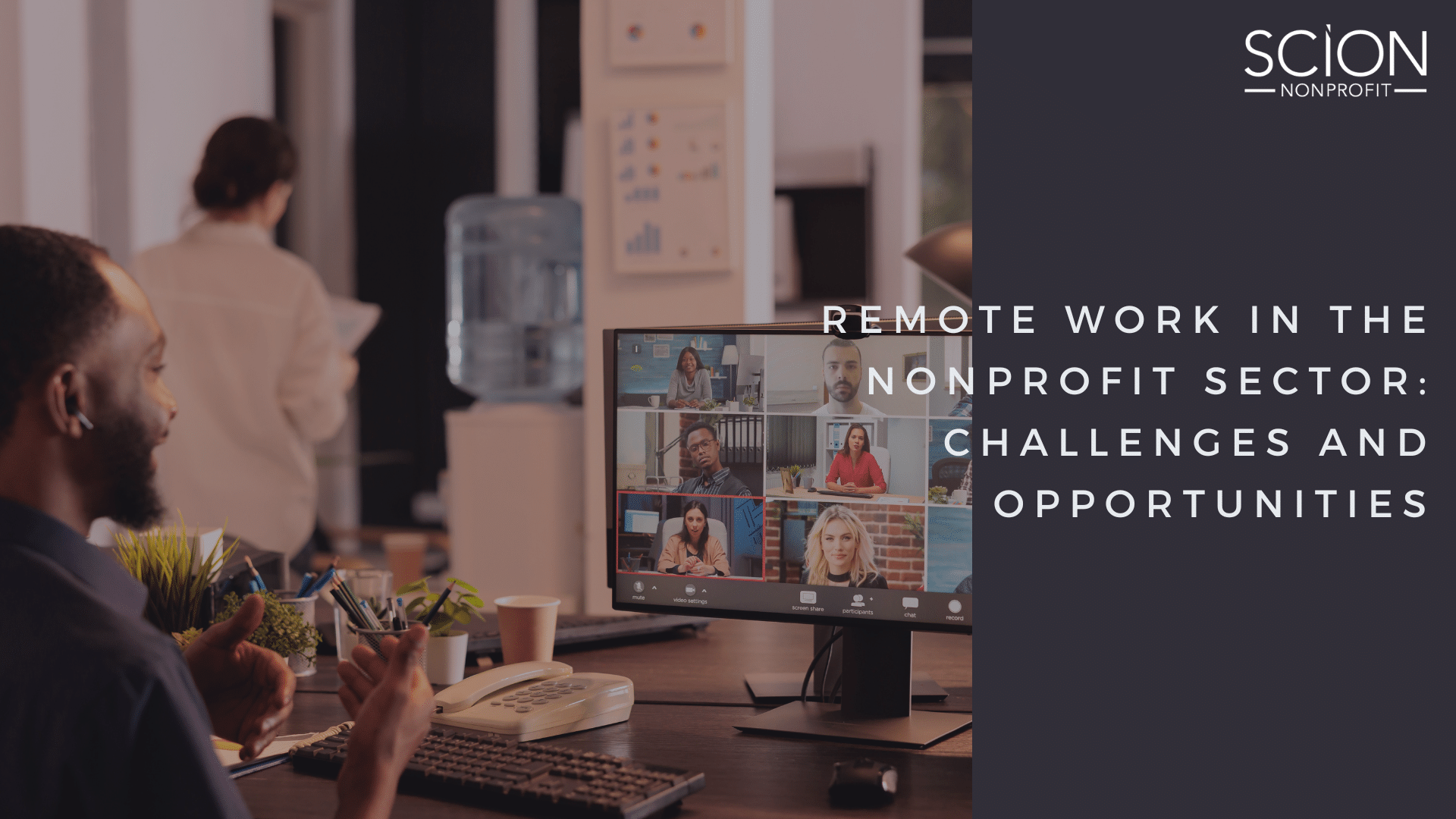
24 May Remote Work in the Nonprofit Sector: Challenges and Opportunities
Recently, many nonprofits have discovered the potential of remote work to expand their reach and empower their teams. However, this shift presents a unique set of challenges and opportunities that require careful navigation. Let’s delve deeper into this evolving landscape in our latest blog.
Remote Work Trends in the Nonprofit Sector
The move towards remote work has undoubtedly reshaped nonprofit operations across the board. Compared to for-profit entities with more established remote work infrastructure, nonprofits may have initially adopted it at a slower pace. This could be due to concerns about maintaining a strong organizational culture or ensuring efficient communication in a dispersed workforce. However, the global pandemic forced a rapid adaptation, demonstrating that many nonprofit roles can be effectively performed remotely. This shift has opened doors for a wider talent pool, allowing nonprofits to recruit passionate individuals who may not have been able to relocate for an on-site position. Additionally, remote work can lead to cost savings on office space and potentially improve employee satisfaction by offering a better work-life balance.
However, it’s important to acknowledge that not all nonprofit roles can be fully remote. Direct service providers, for example, still require a physical presence in the community. Therefore, many nonprofits are adopting a hybrid model, allowing for a mix of remote and in-person work.
A comparative analysis of remote work adoption in nonprofits versus for-profit entities reveals both similarities and differences. While both sectors have seen a rise in remote work, for-profits may have had a head start in terms of establishing infrastructure and best practices. Nonprofits, on the other hand, may need to invest more heavily in technology and training to ensure a smooth transition. However, the shared experience of adapting to a remote work environment presents opportunities for collaboration and knowledge sharing between the two sectors.
The Double-Edged Sword of Managing Remote Teams
Managing a dispersed workforce presents both opportunities and challenges. Communication barriers can arise due to the lack of casual, in-person interactions that can foster spontaneous idea sharing and problem-solving. Fortunately, a variety of solutions exist to bridge this gap. Project management software like Asana or Trello can streamline collaboration and ensure everyone is on the same page. Additionally, fostering open communication channels through video conferencing platforms like Zoom or Google Meet and instant messaging apps like Slack can help maintain a sense of connection and allow for quick questions and updates.
Building and sustaining team cohesion in a remote environment can be another hurdle. Without the shared experience of a physical office space, it can be difficult to cultivate a sense of camaraderie and shared purpose. Here, virtual team-building activities can play a crucial role. Consider online games, virtual brainstorming sessions, or even book clubs to encourage interaction and build relationships. Regular check-ins, both one-on-one and team-wide, are also essential to maintain a sense of connection and ensure everyone feels valued and supported.
Ultimately, effectively managing remote teams requires a shift in mindset and a focus on fostering a culture of trust and transparency. By embracing clear communication, utilizing the right tools, and prioritizing team building, nonprofits can overcome the challenges and unlock the potential of a remote workforce.
Productivity Tools for Remote Work: A Lifeline for Nonprofits
Digital tools are the backbone of successful remote work in the nonprofit sector. Project management software like Basecamp or Monday.com streamlines collaboration by providing a central location for tasks, deadlines, and file sharing. Video conferencing platforms like Zoom, Skype, Microsoft Teams or Google Meet facilitate communication and connection, allowing for virtual meetings, presentations, and training sessions. Cloud storage solutions like Dropbox or Google Drive ensure information accessibility for everyone on the team, regardless of location. Many organizations have successfully integrated such software to empower their remote teams and promote a better work-life balance because of it.
Strategic Leadership in a Remote Nonprofit Environment
Nonprofit leaders are adapting to this new reality by embracing remote supervision and organization-wide management styles. Effective remote leadership involves setting clear expectations through detailed goals and performance metrics. It also requires providing regular feedback, both positive and constructive, to guide and motivate your team members. Most importantly, fostering a culture of trust is essential. This involves empowering your team to make decisions, take ownership of their projects, and communicate openly about challenges.
Training and development remain critical components of a thriving remote team. Explore online training programs and workshops to equip your remote team with the skills necessary to thrive in this new environment. Online courses on topics like remote communication, project management, and time management can be particularly valuable. Additionally, consider offering virtual workshops on leadership development to empower your remote team members to take on more responsibility and excel in their roles.
By embracing strategic leadership practices tailored to a remote environment, nonprofit leaders can build a more engaged and productive workforce. This, in turn, allows them to focus on their core mission and maximize their impact on the communities they serve.
Empowering Your Mission: Building a Remote Dream Team with Scion Nonprofit
At Scion Nonprofit, we recognize the growing importance of remote and hybrid work models in the nonprofit sector. We are dedicated to partnering with mission-driven organizations to build exceptional remote teams that propel their impact. Scion Nonprofit offers a comprehensive solution to streamline your remote and hybrid talent acquisition strategy. Our collaborative approach ensures a seamless and positive experience for nonprofit organizations across the country who are in need of qualified remote staff.
Partnering with Scion empowers you to build a remote or hybrid team that is not only skilled, but also dedicated to furthering your organization’s goals. We are passionate about connecting exceptional talent with the causes they care about. Contact us today to discuss your remote and hybrid hiring needs. Let’s work together to build a dream team that strengthens your mission and drives positive change!
About the Author
Patrick Chiotti (he/him) is an accomplished SEO writer and is currently the Marketing and Communications Specialist at Scion Staffing, bringing years of experience in SEO knowledge and a passion for writing to the Scion team. With additional experience in customer service roles, retail, and accounting, Patrick brings a unique set of knowledge and skills to his role while sharing the passion to continue learning about a wide range of topics so he can share his voice to a larger audience. Outside of Scion, Patrick spends his time as a football coach at the high school level and is passionate about teaching the game, while remaining a student to it. He is also a husband and father, and enjoys fitness, as well as a passion for cooking amazing food.




